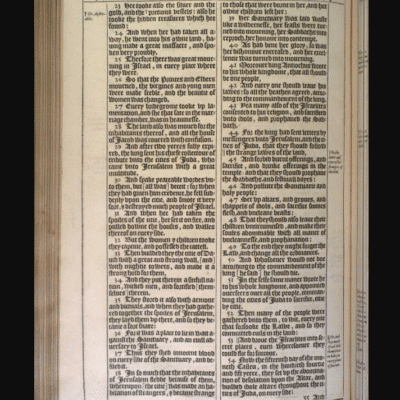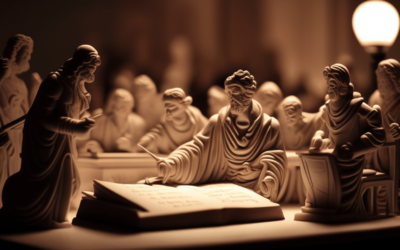- Athanasius (300?-375)
 Athanasius condemns the apocryphal books as non-scripture: 2 “But since we have made mention of heretics as dead, but of ourselves as possessing the Divine Scriptures for salvation; and since I fear lest, as Paul wrote to the Corinthians, some few of the simple should be beguiled from their simplicity and purity, by the subtility of certain men, and should henceforth read other books–those called apocryphal–led astray by the similarity of their names with the true books; I beseech you to bear patiently, if I also write, by way of remembrance, of matters with which you are acquainted, influenced by the need and advantage of the Church . . . 3. In proceeding to make mention of these things, I shall adopt, to commend my undertaking, the pattern of Luke the Evangelist, saying on my own account: ‘Forasmuch as some have taken in hand,’ to reduce into order for themselves the books termed apocryphal, and to mix them up with the divinely inspired Scripture, concerning which we have been fully persuaded, as they who from the beginning were eyewitnesses and ministers of the Word, delivered to the fathers; it seemed good to me also, having been urged thereto by true brethren, and having learned from the beginning, to set before you the books included in the Canon, and handed down, and accredited as Divine; to the end that any one who has fallen into error may condemn those who have led him astray; and that he who has continued stedfast in purity may again rejoice, having these things brought to his remembrance . . . 4 There are, then, of the Old Testament, twenty-two books in number; for, as I have heard, it is handed down that this is the number of the letters among the Hebrews; their respective order and names being as follows. The first is Genesis, then Exodus, next Leviticus, after that Numbers, and then Deuteronomy. Following these there is Joshua, the son of Nun, then Judges, then Ruth. And again, after these four books of Kings, the first and second being reckoned as one book, and so likewise the third and fourth as one book. And again, the first and second of the Chronicles are reckoned as one book. Again Ezra, the first and second(4a) are similarly one book. After these there is the book of Psalms, then the Proverbs, next Ecclesiastes, and the Song of Songs. Job follows, then the Prophets, the twelve being reckoned as one book. Then Isaiah, one book, then Jeremiah with Baruch, Lamentations, and[5] the epistle, one book; afterward, Ezekiel and Daniel, each one book. Thus far constitutes the Old Testament. 5 Again it is not tedious to speak of the [books] of the New Testament. These are the four Gospels, according to Matthew, Mark, Luke, and John. Afterward, the Acts of the Apostles and Epistles (called Catholic), seven, viz. of James, one; of Peter, two; of John, three; after these, one of Jude. In addition, there are fourteen Epistles of Paul, written in this order. The first, to the Romans; then two to the Corinthians; after these, to the Galatians; next, to the Ephesians; then to the Philippians; then to the Colossians; after these, two to the Thessalonians, and that to the Hebrews; and again, two to Timothy; one to Titus; and lastly, that to Philemon. And besides, the Revelation of John. ” (Festal Letter 39:4-5)
Athanasius condemns the apocryphal books as non-scripture: 2 “But since we have made mention of heretics as dead, but of ourselves as possessing the Divine Scriptures for salvation; and since I fear lest, as Paul wrote to the Corinthians, some few of the simple should be beguiled from their simplicity and purity, by the subtility of certain men, and should henceforth read other books–those called apocryphal–led astray by the similarity of their names with the true books; I beseech you to bear patiently, if I also write, by way of remembrance, of matters with which you are acquainted, influenced by the need and advantage of the Church . . . 3. In proceeding to make mention of these things, I shall adopt, to commend my undertaking, the pattern of Luke the Evangelist, saying on my own account: ‘Forasmuch as some have taken in hand,’ to reduce into order for themselves the books termed apocryphal, and to mix them up with the divinely inspired Scripture, concerning which we have been fully persuaded, as they who from the beginning were eyewitnesses and ministers of the Word, delivered to the fathers; it seemed good to me also, having been urged thereto by true brethren, and having learned from the beginning, to set before you the books included in the Canon, and handed down, and accredited as Divine; to the end that any one who has fallen into error may condemn those who have led him astray; and that he who has continued stedfast in purity may again rejoice, having these things brought to his remembrance . . . 4 There are, then, of the Old Testament, twenty-two books in number; for, as I have heard, it is handed down that this is the number of the letters among the Hebrews; their respective order and names being as follows. The first is Genesis, then Exodus, next Leviticus, after that Numbers, and then Deuteronomy. Following these there is Joshua, the son of Nun, then Judges, then Ruth. And again, after these four books of Kings, the first and second being reckoned as one book, and so likewise the third and fourth as one book. And again, the first and second of the Chronicles are reckoned as one book. Again Ezra, the first and second(4a) are similarly one book. After these there is the book of Psalms, then the Proverbs, next Ecclesiastes, and the Song of Songs. Job follows, then the Prophets, the twelve being reckoned as one book. Then Isaiah, one book, then Jeremiah with Baruch, Lamentations, and[5] the epistle, one book; afterward, Ezekiel and Daniel, each one book. Thus far constitutes the Old Testament. 5 Again it is not tedious to speak of the [books] of the New Testament. These are the four Gospels, according to Matthew, Mark, Luke, and John. Afterward, the Acts of the Apostles and Epistles (called Catholic), seven, viz. of James, one; of Peter, two; of John, three; after these, one of Jude. In addition, there are fourteen Epistles of Paul, written in this order. The first, to the Romans; then two to the Corinthians; after these, to the Galatians; next, to the Ephesians; then to the Philippians; then to the Colossians; after these, two to the Thessalonians, and that to the Hebrews; and again, two to Timothy; one to Titus; and lastly, that to Philemon. And besides, the Revelation of John. ” (Festal Letter 39:4-5)- 2 “But since we have made mention of heretics as dead, but of ourselves as possessing the Divine Scriptures for salvation...some few of the simple should be beguiled from their simplicity and purity, by the subtility of certain men, and should henceforth read other books–those called apocryphal – led astray by the similarity of their names with the true books …. 3 …to reduce into order for themselves the books termed apocryphal, and to mix them up with the divinely inspired Scripture…it seemed good to me also, having been urged thereto by true brethren, and having learned from the beginning, to set before you the books included in the Canon, and handed down, and accredited as Divine; to the end that any one who has fallen into error may condemn those who have led him astray; and…4 There are, then, of the Old Testament, twenty
- -two books in number; for, as I have heard, it is handed down that this is the number of the letters among the Hebrews; 5 Again it is not tedious to speak of the [books] of the New Testament…” [the apocryphal books are excluded!] (Athanasius, Festal Letter 39:2-5)
- Jerome (347 – 420)
- Jerome says Judith, Tobit, Maccabees not scripture: “As, then, the Church reads Judith, Tobit, and the books of Maccabees, but does not admit them among the canonical Scriptures, so let it read these two volumes for the edification of the people, not to give authority to doctrines of the Church.”- (Jerome, Prefaces to the Books of the Vulgate Version of the Old Testament, Proverbs, Ecclesiastes, and the Song of Songs).
- Julius Africanus (160-240)
- Julius Africanus says the Apocrypha book of Susanna is a forgery. “In your sacred discussion with Agnomon, you referred to that prophecy of Daniel which is related of his youth. This at that time, as was meet, I accepted as genuine. Now, however, I cannot understand how it escaped you that this part of the book is spurious. For, in sooth, this section, although apart from this it is elegantly written, is plainly a more modern forgery. There are many proofs of this . . . But a more fatal objection is, that this section, along with the other two at the end of it, is not contained in the Daniel received among the Jews.” (Julius Africanus, A Letter to Origen from Africanus About the History of Susanna)
Examples of bad interpretations of Scripture by various Church Fathers
The Church Fathers did a great job of expounding on Scripture. They clarified, defined, and refuted. We owe a debt to...






